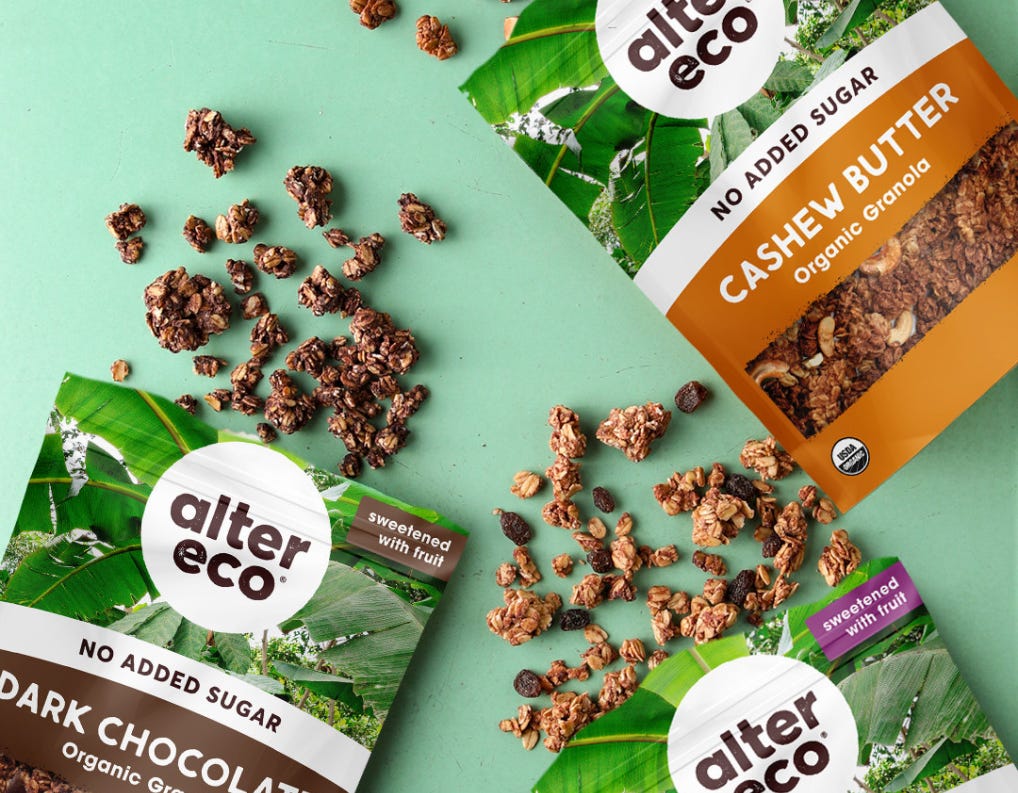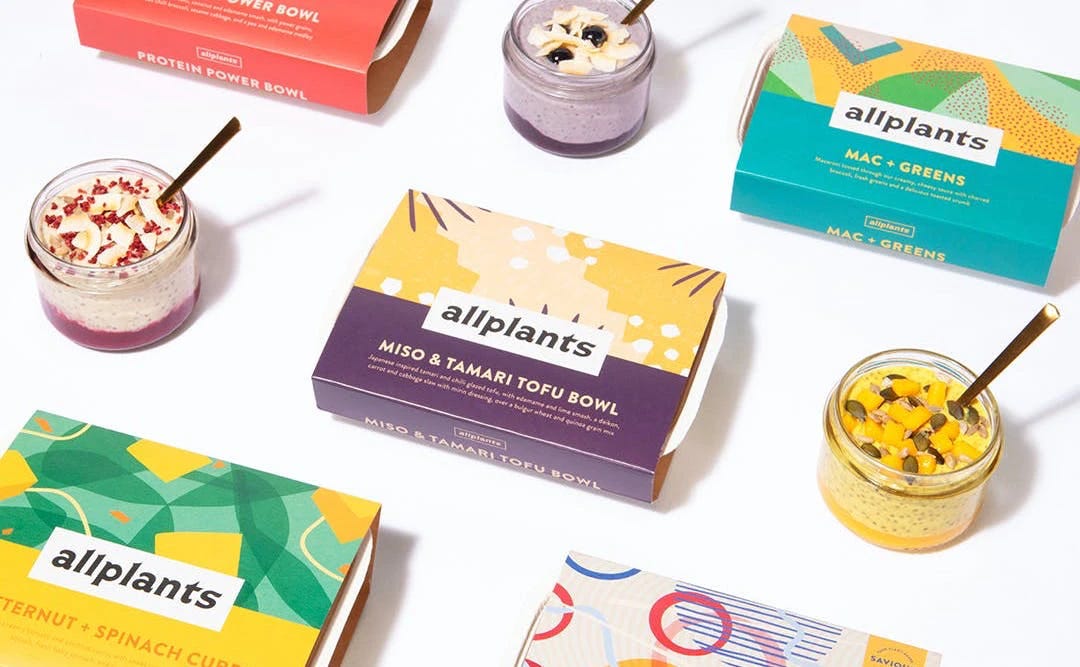🌱 From the ground up: Climate Farmers and Alter Eco reveal two different routes to supporting regenerative agriculture.
Featuring Alter Eco, Steve's Leaves, allplants, Danone and more...
Happy Monday!
This week we’re focusing on how your brand can support regenerative agriculture. We cover:
From the ground up: How to work with Climate Farmers, and support our global food system.
Alter Eco: Investing in a Foundation for regenerative cocoa growing.
In case you missed it: 💥 #9 - Meet the Brands: allplants are going all-in on a more sustainable food system, featuring Ellie Harrison, Sustainability Lead.
👉 Have two minutes? We’d love your feedback - it will help us improve!
> Good News Last Week
🎯 Steve’s Leaves launched their redesigned salad bags, a packaging reduction of 17% that is also now fully recyclable.
🎯 Oddbox has expanded to Scotland, now available in Edinburgh and Glasgow.
⭐️ Ganni announced it is on track to achieve sustainability goals one year ahead of schedule.
⭐️ Puma announced it’s trialling garment-garment recycling in their football jerseys. Called ‘Re: Jersey’, Puma aim to turn old football kit into new kit.
⭐️ Prada announced it was joining the Textile Exchange initiative, which works to drive an increase in the adoption of 'preferred' fibres and materials.
⭐️ Target announced their first ‘environmentally friendly’ store model, located near Seattle, which they’re seeing net zero certifications from the International Living Future Institute.
⚡️ Sourceful, a supply chain transparency startup, announced their $20 million Series A. Sourceful works with brands to shrink the environmental damage associated with their product sourcing choices in areas like packing, via offering a marketplace of vetted suppliers.
⚡️ The EU’s executive arm called for a mandatory minimum use of recycled fibers by 2030, and said it would ban the destruction of unsold products. The European Commission rules also seek to contain the release of microplastics and improve global labor conditions in the garment industry.
> Click on each link to read more.
> Quick Take
From the ground up: How to work with Climate Farmers, and support our global food system.
Regenerative agriculture is fast becoming a pillar of many consumer goods businesses’ sustainability efforts - see Danone’s efforts to support over 100,000 farmers worldwide and allplant’s ‘Future Forward Farming’ pillar as examples. In Project Drawdown, 10 of the 20 best methods to ‘draw down’ CO2 from the atmosphere are variants of regenerative agriculture. Considering only 80 are listed, the continued shift to focusing on the health of our soils and agricultural systems is incredibly important. For FMCG companies, who have an increased reliance on healthy agricultural systems, this can’t be ignored - and it’s not out of reach.
A triple hit of ecosystem regeneration, higher quality food production and increased soil sequestration - regenerative agriculture a win-win-win, if you will. That’s not forgetting plenty of other co-benefits, including animal welfare. However, implementing regenerative agricultural practices incurs costs - making it a considerable investment for farmers operating without support. That’s where companies, like yours, come in. This week, we’re taking a look at Climate Farmers, and how your business can work with them.
Who are ‘Climate Farmers’?
Founded in 2020, Climate Farmers are on a mission to build the infrastructure to scale regenerative agriculture across Europe. Via their Academy, they share best practices for farmers and connect them via the Climate Farmers online community. They also have a ‘Pioneer Program’, providing a two month training scheme for farmers in Europe. Additionally, their Monitoring Team focuses on cutting-edge soil monitoring, with technology and data that will be utilised for farmers, companies and policymakers alike. Finally, Climate Farmers have developed financial instruments through which companies can buy Carbon+ Credits, and farmers can sell them.
Supporting farmers with the initial upfront costs of the transition, after 5, 8 and 10 years further payments are made by Climate Farmers based on the successful completion of the first phase of the project by the farm.
Taking a systemic perspective, a core principle of Climate Farmers is its focus on collaboration - an essential component of scaling impact. They’re also incredibly thorough. From satellite images, to ground truth data, and academic literature reviews - the Climate Farmers platform brings together all available methodologies of data collection related to measuring regeneration, making it accessible for farmers, businesses and policy makers.
Carbon+ Credits - what are they, and what do they do?
At Following the Footprints, we will always encourage mitigation of emissions as the primary step in your sustainability journey. After all, it’s better for emissions to never exist, rather than be compensated. However, we understand that the voluntary carbon market will play an important role in reaching a zero carbon economy. Climate Farmers agree, recommending businesses to first mitigate their emissions as much as possible before working with them. After that, that’s where Carbon+ Credits can come in. Climate Farmers are confident that with the regenerative practices reinforced by Carbon+ Credits, they can support an annual increase of carbon stored in the soil by 1-2%, far above the 0.4% needed annually to fully offset climate-relevant carbon emissions.
Working hard to avoid the pitfalls of many carbon credits; they avoid the double counting of emission reductions by utilising GIS tracking and remote monitoring, and combat non-permanence of many credits by asking participating farms to commit long-term. Climate Farmers also encourage companies to take a local approach, so brands can be specific with which areas they want to invest in and support. Take inspiration from our interview with allplants, who work with farms they aim to source from (via Soil Heroes).
Interested in whether your business can support Climate Farmers, and offset unavoidable emissions in the process? Contact them.
> Brand Spotlight
Alter Eco: Investing in a Foundation for regenerative cocoa growing.
Deemed as “the cleanest, greenest chocolate”, Alter Eco produces organic chocolate and snacks in the US, Canada and Australia. Partnering with PUR Projet to achieve carbon neutrality in 2010, they have been reforesting and insetting their full carbon emissions since 2008. With many chocolate brands relying heavily on mass produced cocoa with little transparency into their supply chain, Alter Eco aims to bring delicious foods to conscious consumers, whilst addressing systemic issues of fair trade and environmental impact.
Since 2005, Alter Eco have built their company and success on three key principles:
Good Growing Practices
Clean Ingredients
Eliminating Waste
These are underpinned by five key commitments:
They became a Force for Good B Corp company back in 2009, and are currently sitting on an impressive score of 133.8. Whilst a score is one thing, their Best of the World awards and proof that they are B Corp leaders makes them a particularly inspiring brand to watch. Within their B Corp certification, Alter Eco have unlocked multiple Impact Business Model (IBM) Questions (more on B Corp and what IBMs are here) on their Supply Chain Poverty Alleviation, Land/wildlife Conservation and Toxin Reduction & Remediation - this is no small feat.
Another big win is their compostable truffle wrapper, which has been in commercial operation since 2013 and is the first of its kind! Whilst they could have stopped there, they planned to make all of their packaging full compostable in your household waste by the end of 2021 - you can read about their progress and on all other things sustainability in their Sustainability Regeneration Report.
To top it all off, in 2020 Alter Eco launched the Alter Eco Foundation. Focussing on regenerative agriculture, the foundation supports projects, companies and farmers to transition their crops and farming techniques from monoculture to agroforestry. Partnering with Erol Foundation and Multiplier to fund the foundation, supporters can also donate via their website. They also want to make this model available to the entire cocoa industry and beyond, expediting adoption within global supply chains through advocacy and education. With an impressive board including Carla Martin and Larry Kopald, opportunities for projects to apply for funding (so long as they have a positive impact on the planet, of course) and no plans of stopping their positive impact on people & the planet, we can’t wait to see where this company goes next.
Want to know more about regenerative agriculture or Alter Eco’s mission? Follow up with:
Support Alter Eco via their shop:
> In case you missed it
💥 #9 - Meet the Brands: allplants are going all-in on a more sustainable food system.
Featuring Ellie Harrison, Sustainability Lead at allplants
> Follow up with…
Article: Look for These 3 Attributes When Buying High-Quality Carbon Credits
Article: A Ballarat farmer's answer to climate change: regenerative agriculture
Podcast: Growing the Green Economy
Book: For the Love of Soil: Strategies to Regenerate Our Food Production Systems







